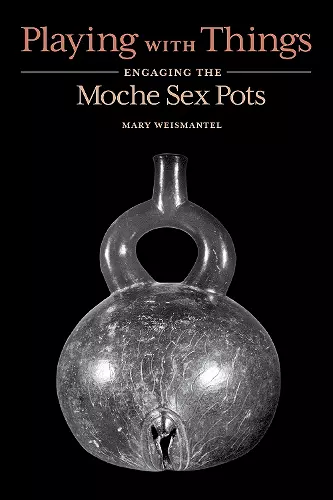Playing with Things
Engaging the Moche Sex Pots
Format:Paperback
Publisher:University of Texas Press
Published:17th Aug '21
Should be back in stock very soon

Winner, Association for Latin American Art-Arvey Foundation Book Award, 2022
More than a thousand years ago on the north coast of Peru, Indigenous Moche artists created a large and significant corpus of sexually explicit ceramic works of art. They depicted a diversity of sex organs and sex acts, and an array of solitary and interconnected human and nonhuman bodies. To the modern eye, these Moche “sex pots,” as Mary Weismantel calls them, are lively and provocative but also enigmatic creations whose import to their original owners seems impossible to grasp.
In Playing with Things, Weismantel shows that there is much to be learned from these ancient artifacts, not merely as inert objects from a long-dead past but as vibrant Indigenous things, alive in their own inhuman temporality. From a new materialist perspective, she fills the gaps left by other analyses of the sex pots in pre-Columbian studies, where sexuality remains marginalized, and in sexuality studies, where non-Western art is largely absent. Taking a decolonial approach toward an archaeology of sexuality and breaking with long-dominant iconographic traditions, this book explores how the pots "play jokes," "make babies," "give power," and "hold water,” considering the sex pots as actual ceramic bodies that interact with fleshly bodies, now and in the ancient past. A beautifully written study that will be welcomed by students as well as specialists, Playing with Things is a model for archaeological and art historical engagement with the liberating power of queer theory and Indigenous studies.
This book will change the way you look at objects forever. Weismantel brings the world of the Moche alive in exhilarating new ways, offering her authoritative and brilliant insights into the body, gender, sexuality, and ways of seeing. Engaging, intimate and provocative, her text positively sparkles, and reveals much about us along the way.— Lynn Meskell
This beautifully written book is without parallel. It demonstrates a methodology to build from museum collections to long-term ecohistory; it demonstrates how to change analyses in light of indigenous and queer theory; and it does all that while also helping us better understand Moche social life. It will be widely read as a model outside of Moche studies, too.— Rosemary Joyce
What this book does very well is envision how these ceramic vessels were a part of people’s lives—their materiality and lively interaction with human bodies, as well as their social connections to the living and the dead that express notions of how life is generated, nurtured, and ensured...[Playing with Things provides] insights into how scholars can approach with fresh eyes subjects that we think we know.— Latin American Antiquity
Refereshing...This is an academic work – thoroughly researched, footnoted, and at times quite theoretical – but Weismantel’s style remains accessible, easy to understand, and rarely mired down in jargon.— Queer as Fact
Weismantel draws from a vast corpus of theory and ethnographic literature to support her arguments but does not dwell on usual concerns of Moche scholars, including ceramic chronology or regional and temporal variation within the Moche sphere...she offers fresh ideas and innovative approaches. The text is witty, engaging, and insightful and will be of interest within and beyond the broader field of anthropology. This book also demonstrates the potential of a fully integrated four-field anthropology in which specialists have the courage and inquisitiveness to venture past the traditional territorial boundaries of the subdisciplines.— Journal of Anthropological Research
Playing with Things provides groundbreaking interpretations of the Moche sex pots and presents frameworks important for material and visual culture studies.— caa.reviews
[Playing with Things] is written in smart, accessible prose that clearly conveys [Weismantel's] nuanced and innovative readings of what is arguably some of the most complex material evidence from the pre-Columbian world...The title Playing with Things perfectly encapsulates the author’s novel and at times nearly whimsical approach to the objects—the freshness of interpreting the bottles by picking them up, smelling them, or listening to them never distracts from Weismantel’s deep understanding of the bottles and especially their iconography...Playing with Things should be read by anyone working on the Indigenous cultures of the New World, past or present, and by scholars within Indigenous Studies, Gender and Sexuality Studies, and Latin American Studies. It will upend, in the most enjoyable way, many long-held notions about what can be learned from unprovenienced art and hopefully inspire a much deeper appreciation for the potential of meticulous scholarly study to recover culturally meaningful information about the intricate worlds of Indigenous sexualities.— American Anthropologist
Weismantel's ethnographic training leads to rich interpretations about these vessels but also about ourselves. These sex pots are archaeological artifacts, but Weismantel approaches them from a place where they were and continue to be vibrant, once part of ancient social lives and still evoking strong reactions from museum visitors...Weismantel proposes a fresh, new, and innovative take on the Moche sex pots that have been of interest for decades. Her active engagement with scholarship on queer theory, materiality, and indigenous worldviews reinvigorates interpretations about the life-giving qualities of the sex pots as functional vessels and sacred instantiations of circulating fluids.— Canadian Journal of Archaeology
Profoundly insightful and an utter delight to read…[Weismantel's] brilliantly effective, inquisitive practice invites readers to play with her as she manipulates the pots, and in this tactile, whole-bodied experience, the vessels cease to be static artifacts and come to life as the socially engaged objects they are.— Latin American & Latinx Visual Culture
ISBN: 9781477323212
Dimensions: 229mm x 152mm x 25mm
Weight: 426g
288 pages